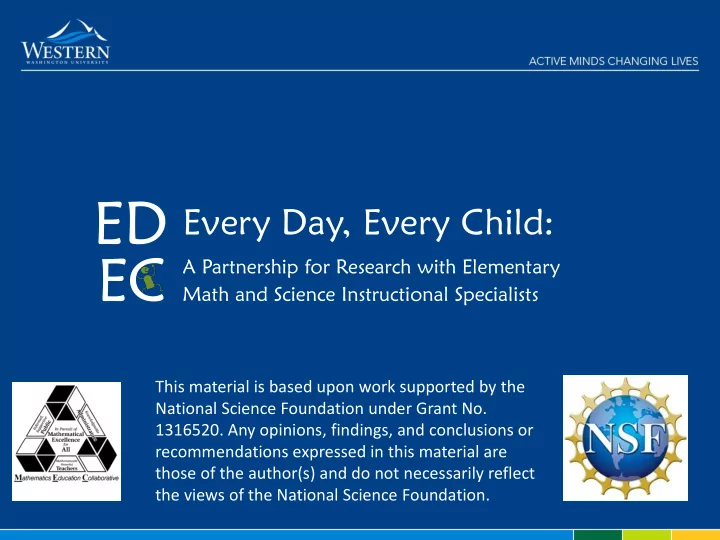

ED Every Day, Every Child: EC A Partnership for Research with Elementary Math and Science Instructional Specialists This material is based upon work supported by the National Science Foundation under Grant No. 1316520. Any opinions, findings, and conclusions or recommendations expressed in this material are those of the author(s) and do not necessarily reflect the views of the National Science Foundation.
Elementary Science Instruction • 4 basic models (Levy, Pasquale, & Marco, 2008) – Classroom teachers teach science (traditional self- contained) – Classroom-based science specialists with own regular classrooms provide resources/support for others* – School-based specialists provide instruction within or across grade levels* – District-based specialists serve across multiple schools
Elementary Instructional Specialist Our working definition: An instructional specialist is a full time (elementary) classroom teacher who teaches two or more classes of students in a specific content area. …but the devil is in the details
Our Project - Five Studies EDEC is an exploratory research project to • understand and categorize instructional specialist models in mathematics and science ; • investigate the content knowledge, preparation and needs of teachers in these roles; • determine the instructional effectiveness of instructional specialists; and • determine the impact of instructional specialists on student learning and attitudes towards mathematics and science. • identify the prevalence of models of content specialization in mathematics and science in elementary schools nationally.
Study 1
Study 1 - Questions • What instructional specialist models are being implemented in elementary classrooms for mathematics and science at participating school districts? What characteristics define these models? • What factors (affordances and constraints) create the conditions for these models to exist, or not, in schools?
Study 1 – Data Collection and Analysis • Teacher Participants – Semi-structured individual or group interviews – Survey • Administrator Participants – Interview – Survey • Analysis – Interviews – qualitative coding – Survey Data – descriptive statistics for comparison
Science Specialist Participants • Year one – 15 total – 10 participated as science specialist only – 5 participated as both math & science specialist • Year two – 15 total – 8 participated as science specialist only – 7 participated as both math & science specialist (two had been science only & added math) • 19 total specialists completed at least part of study (4 lost due to retirement, reassignment, & attrition) • 6 districts, 13 schools
Specialist Interviews • Mixture of individuals & groups of 2-3 depending on school; math & science specialists interviewed together if at same school • Read for initial themes, refined into coding scheme and then coded using NVivo software
Findings - What is happening? • Elementary instructional specialist models for science we found across the two years of the study (categorized according to Gess-Newsome, 1999 framework): – Departmentalized or collaborative specialist: 14/18 – Science specialist (pull-out model): 4/18
Variety of Models • Among departmentalized/collaborative specialists: – Within a grade level (Found in all elementary grades but mostly 3-5): • Science + math specialization (7) • Science + social studies specialization (2) • Science specialization only, otherwise self-contained (1) • Science specialization driven by dual language model (ciencia en espa ñol) (2) – Across two grade levels (4 & 5): • Science + math specialization (1)
Variety of Models • Pull-out science specialist models: – District-level model (3 of 4) • dedicated science specialist teacher for grades 4-6 (plus some 3 rd grade “challenge” students) • dedicated science classrooms in each school – School-level model • Longtime teacher who provides all science instruction for multiple grades of students (1-4 during year 1, 1-3 during year 2), science instruction for resource room students (year 2), technology instruction (both years) & math support (year 1)
Findings – Why is it happening? • Temporal factors • Stakeholder factors
Temporal Lens • Initial Implementation – What were the major factors/influences that led schools to pursue the elementary instructional specialist model in the first place? • Ongoing Specialization – What affordances/ constraints, benefits/ challenges have been found in schools where specialization has been in place for years?
Stakeholder Lens • Who are the important stakeholders in an instructional specialist context? What is important to these individuals? • What are the important connections between stakeholders in an instructional specialist context? What might be important to these connections?
Initial Implementation of Specialization • Teacher-Self as driving force – Background experience/interest in science and desire for continued professional growth – Desire to cover less content in more depth and spread over more time – Challenge of dealing with curricula/resources/standards of all different subject areas
Ongoing Specialization • Stakeholder relationships crucial to success – Teacher-Self • Ability to focus on less content & devote more time to it • Fewer curricula, resources, & standards to juggle • Ability to focus on fewer areas of professional development – Teacher-Teacher • Flexibility • Collaboration • Continuity of expectations – Teacher-Administration • Test scores/data
Ongoing Specialization • Challenges in stakeholder relationships – Teacher-Student • Community & connections • Evaluation • Differentiation – Teacher-Parent/Guardian • Communication – Teacher-Administration • Scheduling
Next steps in analysis • Comparisons between specialist group & matched self-contained group: – Subject-matter knowledge – Views on science teaching & learning – Quality of instruction as observed – PD experiences and needs – Student test data – Student attitudes toward science • Nationwide picture of science specialization
Thank you! Questions? Contacts Joe Brobst – Research Associate SMATE Joe.Brobst@wwu.edu (302) 383-5194 (cell) Kim Markworth - EDEC grant PI SMATE / Math Department Kimberly.Markworth@wwu.edu (360) 650-6284
Recommend
More recommend